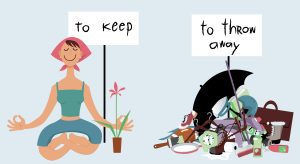
There is a trend towards minimalism, which means that many people feel strong about only keeping items that add value to their life
To start the purging, donation, recycling process follow some of these tips:
Do one area at the time. You will feel personally lighter once you start the process, and will feel motivated to keep going.
Clutter has been linked to stress and anxiety and can even lead toovereating junk foodandprocrastinating. Fields Millburn, an expert in organization and human behavior adds that it can have a negative impact on many areas of life.
Clutter, according to the Minimalists, does more than take up space. Purchasing an item costs money, which can lead to financial stress and the need to work harder to acquire more. Items require storage and space, which can lead to mental and psychological stress. And while people’s first instinct is to tame clutter by purchasing products to help organize it, the Minimalists say this is not the answer.
“Organizing is just well-planned hoarding, Fields Millburn says. Thus, the best way to organize your stuff, per the experts, is to keep the things that add value to your life and get rid of any items that don’t.
Ready to start eliminating things in order to make room for what matters the most? Experts provide this guide to tell you exactly what to toss.
- Toss anything that doesn’t add value
- Just-in-case items
According to experts, the only just in case items we need to keep are emergency items like first aid kits, which you should definitely keep handy.
- Photos and paper
Give yourself permission to get rid of duplicate, similar or blurry photos, coupons or mailers you aren’t using, bills and statements you can get online, old newspapers and magazines, and things you’ve ripped out of a magazine.Scan photos and toss out physical copies, or take a photo of the photo to create a digital version.
- Actual trash
Begin thedecluttering processby emptying the trash around the house. This is good to start with because you have no emotional attachment to it. Empty your wastebaskets, shred piles of papers you’ve been meaning to shred and get rid of the junk mail piling up on your kitchen counter.
- Damaged items
Holding onto a favorite mug that’s chipped or necklace that’s fallen apart? Time to let go.
The same goes for things that are missing parts. For instance, toss out / recycle any Tupperware missing lids.
- Extras/duplicates
“You always use your favorites but still have extras for a variety of reasons, Items that fall into this category can include coffee cups, measuring cups and spoons, wooden spoons, wire whisks, handbags, sunglasses and pens, and / or other household decoration items..
- Stuff you never use
Donate or discard things like random spices and sauces, uncomfortable shoes, empty frames and containers, books you’ve already read or never plan on reading, junk drawer items (or the whole drawer), knickknacks, freebies or gifts you were given but don’t like.
- An abandoned hobby
Be realistic about which hobbies you’ve moved on from and toss the related materials you’re not using. And if you come across hobby materials and want to finish the project, go ahead. Allowing finishing a project to count as decluttering is a really helpful mindset shift, However, keeping brushes for a painting hobby you’re never going to have is not.
- Items from a past phase
If you don’t have a dog anymore and don’t plan on getting a new one, give yourself permission to get rid of the dog bed, bowl and leash. And if you’re retired, pack up the majority of your professional clothes and office supplies. This, White says, will give you more space for items that serve the phase of life you’re in right now.
- Anything expired
This includes medications, food and makeup. Did you know that if you wear bad makeup,you could get pink eye, inflammation, which can lead to redness, bumps, a rash, or even blisters and swelling?
- Things that bring up bad memories
If an item doesn’t make you feel good, send it on its way. Clear your space to welcome new experiences and people into your life. Sites like Facebook Marketplace, Craigslist and Offer Up are easy ways to list things to sell or give away.
- Clothes that don’t fit
“Many of us haveskinny jeans or T-shirts from high school that no longer fit us. Your closet should house items you look forward to wearing instead of being a place to cast aside what you know you’re not going to wear.
- Digital clutter
Digital clutter can build up as well. Unsubscribe to podcasts you don’t listen to and delete music you don’t enjoy from iTunes. Drag documents you saved and never access, or email you don’t need, to the trash.Unsubscribe from email subscriptionsyou aren’t using and from people on social media you don’t want to follow anymore. Delete apps that drain your time and energy and social media platforms you no don’t care about.
